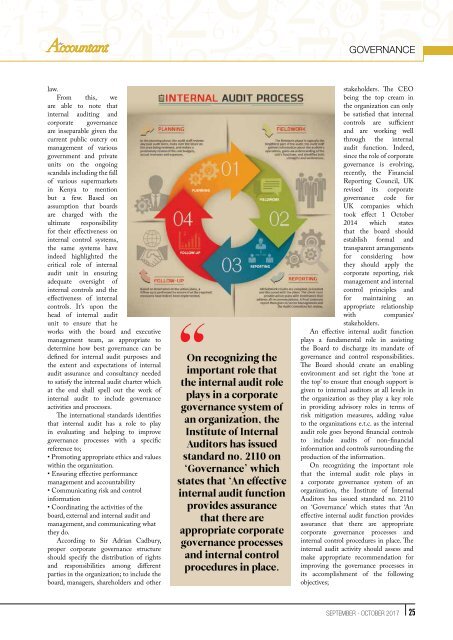The-Accountant-Sep-Oct-2017-Final
Create successful ePaper yourself
Turn your PDF publications into a flip-book with our unique Google optimized e-Paper software.
Governance<br />
law.<br />
From this, we<br />
are able to note that<br />
internal auditing and<br />
corporate governance<br />
are inseparable given the<br />
current public outcry on<br />
management of various<br />
government and private<br />
units on the ongoing<br />
scandals including the fall<br />
of various supermarkets<br />
in Kenya to mention<br />
but a few. Based on<br />
assumption that boards<br />
are charged with the<br />
ultimate responsibility<br />
for their effectiveness on<br />
internal control systems,<br />
the same systems have<br />
indeed highlighted the<br />
critical role of internal<br />
audit unit in ensuring<br />
adequate oversight of<br />
internal controls and the<br />
effectiveness of internal<br />
controls. It’s upon the<br />
head of internal audit<br />
unit to ensure that he<br />
works with the board and executive<br />
management team, as appropriate to<br />
determine how best governance can be<br />
defined for internal audit purposes and<br />
the extent and expectations of internal<br />
audit assurance and consultancy needed<br />
to satisfy the internal audit charter which<br />
at the end shall spell out the work of<br />
internal audit to include governance<br />
activities and processes.<br />
<strong>The</strong> international standards identifies<br />
that internal audit has a role to play<br />
in evaluating and helping to improve<br />
governance processes with a specific<br />
reference to;<br />
• Promoting appropriate ethics and values<br />
within the organization.<br />
• Ensuring effective performance<br />
management and accountability<br />
• Communicating risk and control<br />
information<br />
• Coordinating the activities of the<br />
board, external and internal audit and<br />
management, and communicating what<br />
they do.<br />
According to Sir Adrian Cadbury,<br />
proper corporate governance structure<br />
should specify the distribution of rights<br />
and responsibilities among different<br />
parties in the organization; to include the<br />
board, managers, shareholders and other<br />
On recognizing the<br />
important role that<br />
the internal audit role<br />
plays in a corporate<br />
governance system of<br />
an organization, the<br />
Institute of Internal<br />
Auditors has issued<br />
standard no. 2110 on<br />
‘Governance’ which<br />
states that ‘An effective<br />
internal audit function<br />
provides assurance<br />
that there are<br />
appropriate corporate<br />
governance processes<br />
and internal control<br />
procedures in place.<br />
stakeholders. <strong>The</strong> CEO<br />
being the top cream in<br />
the organization can only<br />
be satisfied that internal<br />
controls are sufficient<br />
and are working well<br />
through the internal<br />
audit function. Indeed,<br />
since the role of corporate<br />
governance is evolving,<br />
recently, the Financial<br />
Reporting Council, UK<br />
revised its corporate<br />
governance code for<br />
UK companies which<br />
took effect 1 <strong>Oct</strong>ober<br />
2014 which states<br />
that the board should<br />
establish formal and<br />
transparent arrangements<br />
for considering how<br />
they should apply the<br />
corporate reporting, risk<br />
management and internal<br />
control principles and<br />
for maintaining an<br />
appropriate relationship<br />
with companies’<br />
stakeholders.<br />
An effective internal audit function<br />
plays a fundamental role in assisting<br />
the Board to discharge its mandate of<br />
governance and control responsibilities.<br />
<strong>The</strong> Board should create an enabling<br />
environment and set right the ‘tone at<br />
the top’ to ensure that enough support is<br />
given to internal auditors at all levels in<br />
the organization as they play a key role<br />
in providing advisory roles in terms of<br />
risk mitigation measures, adding value<br />
to the organizations e.t.c. as the internal<br />
audit role goes beyond financial controls<br />
to include audits of non-financial<br />
information and controls surrounding the<br />
production of the information.<br />
On recognizing the important role<br />
that the internal audit role plays in<br />
a corporate governance system of an<br />
organization, the Institute of Internal<br />
Auditors has issued standard no. 2110<br />
on ‘Governance’ which states that ‘An<br />
effective internal audit function provides<br />
assurance that there are appropriate<br />
corporate governance processes and<br />
internal control procedures in place. <strong>The</strong><br />
internal audit activity should assess and<br />
make appropriate recommendation for<br />
improving the governance processes in<br />
its accomplishment of the following<br />
objectives;<br />
september - october <strong>2017</strong> 25

















